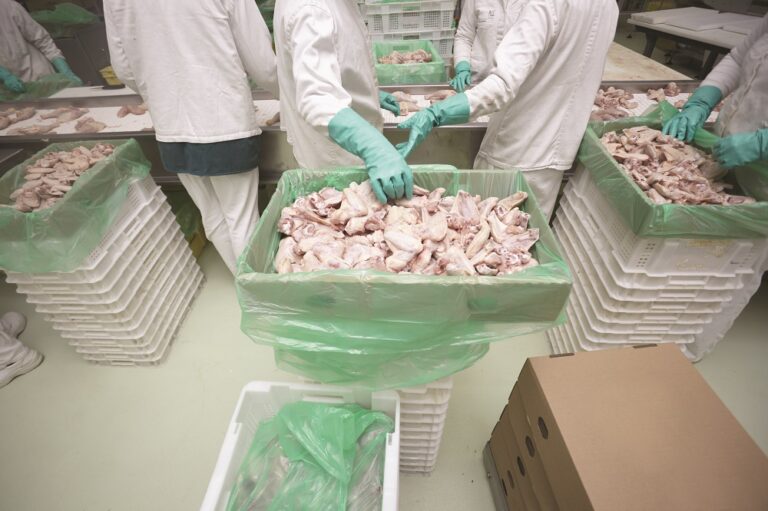More European countries are banning non-stun slaughter. Now there are calls to change the law in the UK.
Earlier this year, the Flanders region of Belgium brought into force new legislation banning the slaughter of animals without prior stunning.
Belgium joins several other European countries, including Iceland, Sweden, Switzerland and Denmark in making this decision.
Although the slaughter of animals without prior stunning has always caused consternation among some groups worried about welfare, the recent decision by Belgium has prompted a joint call from the British Veterinary Association and the RSPCA to outlaw the practice in the UK, with big implications for the poultry sector.
In an open letter to the government, industry and wider public, the two organisations have called on Michael Gove to repeal a legal exemption that permits animals to be slaughtered without pre-stunning for religious reasons.
Both Jewish and Islamic traditions specify non-stunned meat. However, while all animals slaughtered under the shechita (for kosher meat) are non-stunned, halal requirements vary and between two thirds and three quarters of meat labelled halal is from animals that have been pre-stunned.
The most recent FSA survey of slaughter methods carried out in 2018 shows poultry slaughtered without stunning included 9.7% of broiler chickens; 1.4% of spent hens; 0.5% of turkeys and 0.2% of other poultry.
Poultry makes up the vast majority of animals slaughtered without pre-stunning, around 118 million of 120 million animals overall slaughtered without pre-stunning, meaning any change to the law would have significant repercussions for processors.
RSPCA chief executive, Chris Sherwood said: “We’re opposed to non-stun slaughter and we’re calling for an end to the practice as it seriously compromises animal welfare. Our concern does not relate to the expression of religious belief but the welfare of animals.
“Until there is a change in the law to end non-stun slaughter, there are several measures the UK Government could introduce to reduce the suffering involved in this practice. For example, by ensuring trade deals with other countries do not include non-stun meat or live animals for non-stun slaughter, clear labelling should be adopted to enable consumers to make an informed choice about the meat they buy and how it was slaughtered.”
BVA President Simon Doherty said: “The UK Government has repeatedly stated it would prefer to see all animals stunned before slaughter but has taken no action to address this critical welfare issue that affects millions of animals every year.
“There is a huge groundswell of support for a ban on non-stun slaughter, and recent developments in Belgium show that decisive change is possible where public support is matched by political will. Michael Gove has made clear that he wants to maintain and build on the UK’s reputation as global leader on animal welfare; banning non-stun slaughter is a surefire way of showing he will deliver on this commitment.
“If slaughter without stunning continues to be permitted in the UK, then meat and fish from this source must be clearly labelled, to help customers make informed choices about the food that they buy and eat.”
The two organisations are also calling for meat to be labelled with the method of slaughter, e.g. stunned or non-stunned, so consumers are fully informed about the meat that they are buying; non-stun slaughter to only be permitted at levels that meet local religious community demand for this type of meat in the interests of limiting animal pain and suffering; and a ban on export of meat from non-stunned animals or live animals destined for non-stun slaughter.
A Defra spokesperson said the government had no current plans to change regulations and said there were strict rules for to provide the maximum possible protection to animals subject to religious slaughter. Guidance on the requirements for halal and kosher slaughter is at https://www.gov.uk/guidance/halal-and-kosher-slaughter
“We would prefer that all animals are stunned before slaughter, but we accept the rights of people who are Jewish or Muslim to eat meat prepared in accordance with their religious beliefs,” said a Defra spokesperson. “We do, however, expect industry to provide consumers with the information they need to make informed choices.
“This is an issue the Government is considering closely in the context of the UK’s exit from the EU. We will continue work with stakeholders on issues such as labelling, slaughter practices and transparency of demand for non-stunned meat.”


